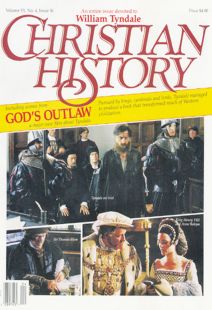From the Archives: From The Obedience of a Christian Man
According to Tyndale experts, the translator’s basic purpose in this treatise was to set forth, based on Scripture alone, his understanding of the real duties of a Christian—and to show how the abuses and imbalances of the institutional church of the time were leading people away from these “true duties.” In the book’s several chapters, Tyndale treats, in order, the expectations God outlines in Scripture for children, wives, servants, and the king’s subjects. He then proceeds to God—ordained duties for husbands, masters, landlords, judges and king’s officers, showing how, in his interpretation, each ought to rule. Then he suggests ways in which the papacy’s abuses had usurped the authority allotted to these other powers, hence dealing with the sacraments, the Antichrist, baptism, wedlock, monastic orders, penance, confession, contrition, absolution, anointing, miracles, the adoration of saints, and prayer. He then analyzes and critiques the four approaches to Scripture interpretation that were prevalent at the time, and concludes with “a compendious rehearsal of that which goeth before.” This extract is from that “rehearsal.”
I HAVE DESCRIBED unto you the obedience of children, servants, wives, and subjects. These four orders are of God’s making, and the rules thereof are God’s Word. He that keeps them shall be blessed—yea, is blessed already—and he that breaketh them shall be cursed.
If any person, from impatience or a stubborn and rebellious mind, withdraw himself from any of these, and get him to any other order, let him not think thereby to avoid the vengeance of God in obeying rules and tradition of man’s imagination.
If thou shavest shine head in the worship of thy Father, and breakest His commandments, shouldest thou so escape? Or, if thou paintest thy Master’s image on a wall and slickest up a candle before it, shouldest thou therewith make satisfaction for the breaking of His commandment? Or, if thou wearest a blue coat in the worship of the king and breakest his laws, shouldest thou so go quit?
Let a man’s wife make herself a sister of the chatterhouse, and answer her husband, when he bids her hold her peace. My brethren keep silence for me, and see whether she shall so escape. And be thou sure that God is more jealous over His commandments than man is over his, or than any man is over his wife.
Because we are blind, God has appointed in the Scripture how we should serve Him and please Him. As pertaining unto His own person, He is abundantly pleased when we believe His promises and the holy testament which He has made unto us in Christ, and [hence] for the mercy which He there showed us, [we] love His commandments.
All bodily service must be done to man in God’s stead. We must give obedience, honor, toll, tribute, custom and rent unto whom they belong. Then if thou have ought more to bestow, give unto the poor which are left here in Christ’s stead, that we show mercy to them . . . .
Therefore, I say, is a Christian called to suffer even the bitter death for his hope’s sake, and because he will do no evil. I showed also that kings and rulers, be they ever so evil, are yet a great gift of the goodness of God, and defend us from a thousand things that we see not.
I proved also that all men, without exception, are under the temporal sword, whatsoever names they give themselves. Because the priest is chosen out of the laymen to teach this obedience, is that a lawful cause for him to disobey? Because he preaches that the layman should not steal. is it therefore lawful for him to steal unpunished? . . .
Moreover, Christ became poor, to make other men rich, and bound, to make others free. He left also with His disciples the law of love. Now love seeketh not her own profit, but her neighbor’s . . . . The spirituality [the clergy], therefore, are condemned by all the laws of God, who through falsehood and disguised hypocrisy have sought so great profit, so great riches, so great authority and so great liberties; and have so beggared the laymen, and so brought then into subjection and bondage, and so despised them, that they have set up franchises in all towns and villages, for whosoever robs, murders or slays them, and even for traitors unto the king’s person also.
By William Tyndale
[Christian History originally published this article in Christian History Issue #16 in 1987]
Next articles
William Tyndale: Recommended Resources
Where to find more information about William Tyndale and his times.
the EditorsWomen in the Early Church: From the Publisher
Introduction to Women in the Early Church and a looks at Christian History's point of view.
the EditorsOther Women of the Early Church: Special Gallery Section
Who was who among women (real and fictional) in the early church.
Mary L. Hammack and the EditorsWhat About Paul?
The Apostle’s writings are foundational to the standard interpretation of what women’s role in the church should be. But examined carefully, his points about women raise several puzzling questions
Randy Petersen



